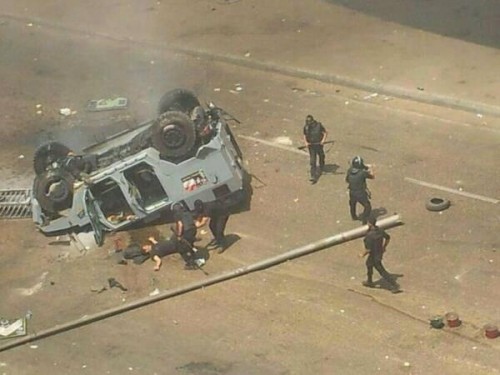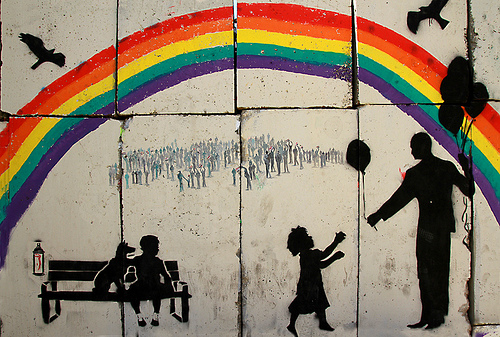“Whoever fights monsters should see to it that in the process he does not become a monster.” —Nietzsche
LATELY, IT SEEMS that every time I sit down to write about Egypt, after our revolution, I am under-slept and overwhelmed. Certainly, following this week’s horrific massacre, this is no exception. To date, and if the Egyptian Ministries are to be trusted (always a big IF) the death toll stands at 638—about as many people as were killed during the historic eighteen days it took to oust Mubarak—and a staggering 3,994 injured. This is to say nothing of the uncounted bodies still waiting to be officially processed, or numerous reports of families being pressured to sign statements saying the causes of death were suicide, in order for them to claim the bodies of their loved ones.
Sickening, in this context, to hear Prime Minister El-Beblawi praising the police for “self restraint”—which is, of course, not to excuse the pro-Morsi supporters/Muslim Brotherhood of the dreadful havoc they’ve wreaked. Frankly, I’ve had neither the heart nor stomach to watch any of the gruesome videos circulating, but on the basis alone of the dozens of churches they have burned, they have forgone the moral right to speak of “legitimacy” ever again. How we respond to violence and injustice also defines us.
Yet, because I dared to share on social media news of El Baradei’s principled stepping down as interim PM, I have been drawn into exhausting virtual battles by “friends” for supporting this traitor, and told by otherwise gentle-seeming folks (cultured, liberal, even Sufi-admiring) that the army’s use of violence is completely justified, that the Muslim Brotherhood are cockroaches, a cancer, basically inhuman, and therefore deserve to die, unmourned.
Here are El Baradei’s closing words from his resignation statement: “I am afraid I cannot afford to bear the responsibility of a single drop of blood before God, and before my conscience and the citizens of Egypt. Unfortunately, the beneficiaries of today’s events are the advocates of violence and terrorism.” To my ears, these are words of sanity, posing ethical questions we should all be asking ourselves. What becomes of us when we condone the excessive use of violence and mass murder? Are we not accomplices? And how is it that we are able to put our blind trust in the army after we’ve suffered their abuses of power in the not-too-distant past (the Maspero massacre, virginity tests, and so forth). Yes, I am one of many relieved, after the gross and dangerous ineptitude of Morsi’s leadership, for Egypt to have another chance at real freedom. But might we also imagine that post the people-endorsed coup, the army might have its own cynical agenda in mind (read more power)?
Those who pit us against each other, or set churches on fire and terrorize us, are not our friends. This is not why the long-suffering Egyptians dared to dream of revolution in the first place; Egypt deserves better than having her hopes tossed between the devil and the deep blue sea. And, to be sure, we’ve other ‘devils’ besides six decades of military rule or the perils of the Muslim Brotherhood to contend with. Lack of education is certainly one, and in the words of Aristotle, “Poverty is the parent of revolution and crime.” We would do better, then, to address these serious societal ills than allow ourselves to be distracted and deceived into more tragic battles.
Surely, there were other ways to “clear the sit-in” besides mass extermination of the protestors. Violence is always a failure of imagination and compassion, and it always begets violence; just as fighting hate with hate only escalates it. This is the unraveling we are witnessing now. This is how we ended up in this choiceless mess in the first place (i.e., between the Military and Muslim Brotherhood stalemate.)
Understandably, emotions are running high, and patience is wearing thin in the face of so much daily chaos, so many disappointments and seemingly no hope in sight. But, in the midst of all this, we must not lose sight of each others humanity, since how we respond to these soul-trying challenges is what will determine who we become. Which is to say, hard as it may appear at times to see past the divisiveness, hurt and fatigue, it is worth trying even harder to remember the noble goals of our peaceful Revolution. We were stronger when we united around common goals, and focused instead on what we love: Freedom, Dignity, Egypt. All human life is sacred, equal; and we should see to it in fighting the monsters of injustice, ignorance and oppression that we do not become monsters ourselves.





Pingback: Egypt: The Unraveling — The Good Men Project